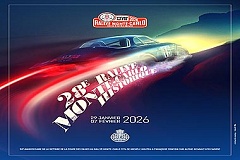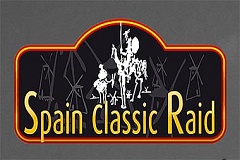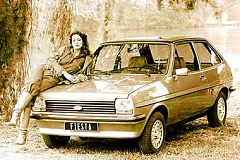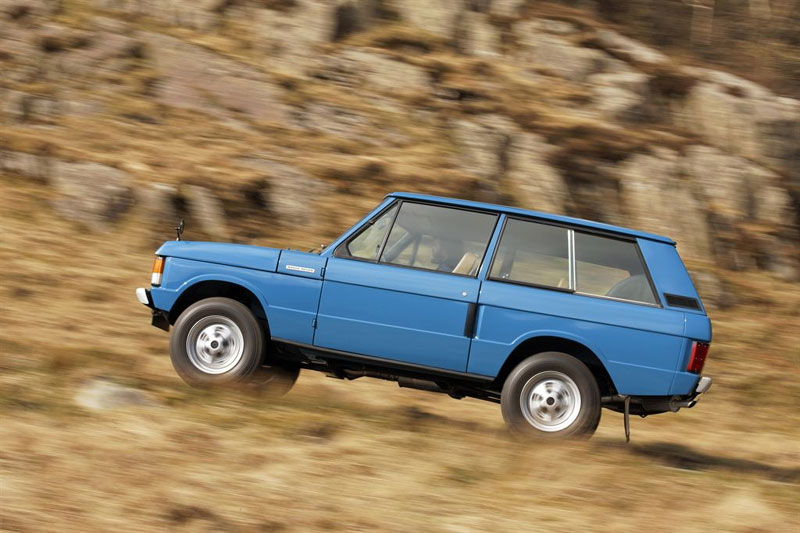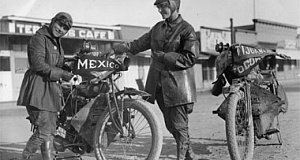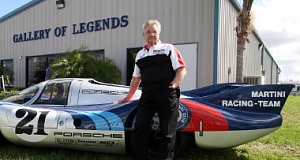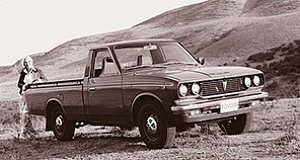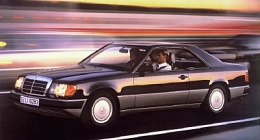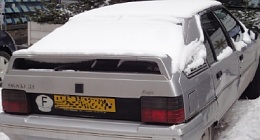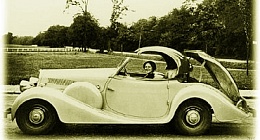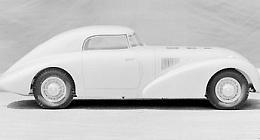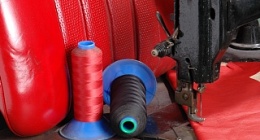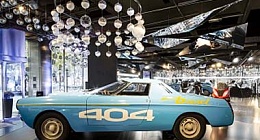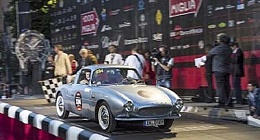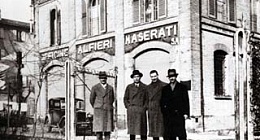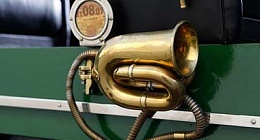The world's first luxury 4x4
The Range Rover went on to be the world's first luxury all-terrain vehicle. But, although that first Range Rover had a luxury car ride and premium saloon performance, it certainly did not have the trimmings of a luxury car. That came quite a few years later.
The first Range Rover was a relatively spartan vehicle inside, with vinyl seat trim and vinyl and moulded rubber flooring to make it easy to hose out. There was no wood, or leather, or even carpet. "It certainly wasn't a luxury vehicle, at least not initially," says Spen King. "In many ways, it was quite basic."
Adds Geof Miller: "The 'basic' interior was a sop to the Land Rover people (as opposed to the Rover car engineers) who wanted a simple hose-out interior. Sales were excellent. There was a black market almost straight away, as demand exceeded supply. Yet we knew that the interior was too basic. There were moves, almost immediately, to up-spec the vehicle, including improved trim. Carpet came quite quickly. It started on the transmission tunnel, where it also had the happy effect of quietening transmission whine. The boot area - which had been bare metal on prototypes - was soon trimmed, including a cover for the tool kit. This was partly because of feedback from Buckingham Palace. The tools were exposed in the boot and a man from the palace said a corgi could get hurt."
Two doors only
The original Range Rover had two doors only, and there was no automatic transmission option - although one of the early Land Rover-based prototypes had a Borg Warner three-speed automatic shift. Geof Miller stayed on the Range Rover project after its launch, and soon identified a four-door body as essential. Eighteen months after launch, a four-door prototype - with hatchback rear end - was built. Management however mothballed the car. A production four-door wasn't launched until 1981. Automatic transmission didn't become an option until 1982. Both were essential to any US success, where sales began in 1987.
The Classic lasts for 25 years
That first Range Rover was so far ahead of its time that it lasted in production, and sold well, for more than 25 years. Initially, in the '70s, the vehicle changed little. It was a bleak decade for the UK motor industry, with the three-day week and general political unrest. There was precious little development cash, and, besides, the Range Rover was selling well. Why change it? Cash-strapped British Leyland, Land Rover's then owners, spent development money elsewhere.
By the '80s, the pace of development picked up, mostly to make the vehicle more luxurious. Cabin trim was regularly upgraded, and carpet, leather upholstery and wood trim elevated the Range Rover into a viable alternative to luxury saloon cars - the first 4x4 to do so.
The 3.5-litre aluminium V8 was enlarged to 3.9 litres in 1989, and then to 4.2 litres in 1992, improving performance and refinement. The three-speed Chrysler automatic gearbox - first available in 1982 - was replaced by a smoother and more efficient ZF four-speed in 1985, further broadening appeal.
A long wheelbase version, the LSE, featuring height adjustable electronic suspension came out in 1992, a few years before the launch of the next Range Rover. The electronic suspension was also optional on the normal 100-inch wheelbase model.
Second-generation Range Rover, the P38a
The next generation Range Rover, now often known as the 'P38a' (because it was developed in building 38A in the Solihull factory), dialled up luxury, on-road ability and off-road versatility. It was an evolutionary design, 'retaining many of the key design features of the classic model', according to the press kit. Burr walnut and leather upholstery were used extensively, to underscore the car's luxury credentials, and its desire to win over owners of conventional luxury cars.
Three engines were offered, including a BMW 2.5 six-cylinder turbo diesel - which offered considerably better performance than the old Classic diesel - and both 3.9 and 4.6 versions of the aluminium Rover V8. The 4.6 gave a top speed of 125mph and 0-60 acceleration in 9.3 seconds, the fastest production Range Rover to date.
The height adjustable suspension, which made its debut at the twilight of the Classic's life, was further developed for the P38a and was offered as standard, improving both ride comfort and off-road potential.
Third-generation Range Rover, the L322
The latest Range Rover represented a big jump. Launched in 2001, it scaled new heights in the 4x4 sector in both luxury and on- and off-road capability. CEO Bob Dover called it, 'the world's most capable vehicle, with the greatest breadth of ability of any car ever made'.
Among the new features were the stiffer monocoque body (replacing the traditional 4x4 ladder frame) and the fully independent suspension with interconnected air springs (nearly all 4x4s had, and many still have, rigid axles). The interior was also widely lauded as the finest of any car cabin.
At the car's launch, the head of Ford's Premier Automotive Group (of which Land Rover formed part), Dr Wolfgang Reitzle, said: "The new Range Rover is truly extraordinary. Its unique combination of go-anywhere skill and luxury means its closest rivals aren't other 4x4s but the finest luxury saloons in the world."
Design
'It's not difficult to see why it was so successful. Like the current version, the original Range Rover is such a simple and iconic shape'
The shape of a Range Rover is instantly recognisable. "You can describe a Range Rover with three or four lines on a piece of paper," says former design director Geoff Upex, responsible for the current model. "A child could draw the basic shape, so it's instantly recognisable in the same way as a Mini or a Porsche 911 or a Volkswagen Beetle.
"There are four or five elements that make up a Range Rover design: the simplicity of the side elevation, the relationship of the glass to the body, the floating roof and the castellated bonnet. The same is true of the inside of the car. It was designed so that people sit as far out as possible and have the best view. They can see out down the bonnet and see all corners of the vehicle. So it's about command driving. It's also a very nice place to be. I have driven many different vehicles. Nothing quite gives that same sense of well-being as being inside a Range Rover."
Current design director Gerry McGovern adds: "It's not difficult to see why it was so successful. Like the current version, the original Range Rover is such a simple and iconic shape."
Those iconic details are all there for a reason, for the Range Rover is a highly functional vehicle. The bonnet castellations improve the driver's ability to see the corners of the car. They're helpful in congested city driving, in parking, and when driving off-road. The 'floating' roof is partly an upshot of those comparatively thin pillars, to improve visibility.
On the very early production Range Rovers, the roof pillars were body coloured. It was not possible to manufacture these pressings with a suitable quality finish, so the pillars were soon covered in a black 'pseudo-hide' finish. The hide boosted the 'floating roof' effect.
The comparatively flat sides, and lack of 'tumblehome' curvature, allow driver and passenger to sit as far out as possible, improving visibility. Those relatively flat sides also improve the driver's ability to judge vehicle width, important for manoeuvrability on- and off-road.
Even though it's become a design classic - a model was displayed inside the Louvre in Paris, while an actual vehicle was simultaneously shown just outside - Spen King claims that 'we probably only spent about 0.001 per cent of our time on the appearance'. Like many design greats, form followed function. The superb functionality led to a simple style and a simple shape.
The concept and basic shape - flat sides, thin roof pillars, short overhangs, all dimensions including wheelbase, upright nose and tail - was determined by engineers, principally King and chassis engineer Gordon Bashford. The initial press kit didn't even talk about 'design'.
The design, for King's concept, came from David Bache, Rover's design boss. Bache's design CV is impressive - Rover SD1, Rover P5 and P6, Series II Land Rover. But the Range Rover Classic was his finest hour.
He tidied up the King/Bashford proposal, adding his design ideas to the inherent functionality. In particular, he changed the grille and headlamps, and the tail lamps. He also altered the window surrounds and side swage lines. They were not major details, but they made a huge difference to the car's presence and aesthetic appeal.
Nowadays, of course, the design department has an early and important voice in a new car's development. "Back then, it didn't," says design director Gerry McGovern. "The design department gave 'style' to the engineering department's vision. It was a fundamentally different approach."
The second-generation Range Rover
The Range Rover's design has remained evolutionary. "The original vehicle was such a classic, that it made sense to retain the basic shape and keep the car's classic design cues," says design director Gerry McGovern.
The second-generation vehicle, the P38a, was a 'clean sheet' design, but it soon became clear to the design team that they radically changed the style at their peril. 'They were very conscious that Range Rover customers are an extremely loyal group, and over the years market research has shown that they would be reluctant to accept major changes in exterior design', said the original P38a press kit.
The key qualities they protected, as explained at launch, were: the command driving position, the floating roof (caused by the black, rather than body colour, roof pillars), the deep glass area and low waistline, wrap-over bonnet (including 'castle features' on front edge), distinctive rear 'E' pillar, two-piece tailgate (the lower part of which was widely used as a viewing platform), the straight feature lines (no wedge or step in side styling) and the close wheel cuts (to improve stance).
The third-generation model
All the classic Range Rover design cues continued with the third-generation model launched in 2001. The new car was bigger and more spacious. It also included eye-catching modern 'jewellery', including distinctive head- and tail-lamps and 'Brunel' finish power vents on the flanks.
This model was a more integrated 'purer' design than the P38a. Although subsequently upgraded with improved lights, grille, wheels and many other changes, the essential shape has stayed the same, and remains one of the most modern and desirable designs in the luxury 4x4 sector.
The interior saw a big improvement over its predecessor. The design team took inspiration from products as diverse as audio equipment, ocean-going yachts, first-class airline seating, fine furniture and jewellery. This was combined with the classic 'wood and leather' Range Rover experience. The result brought new levels of luxury to the Range Rover, and to the 4x4 market. It was subsequently described, by a number of commentators, as the finest cabin in motoring.
Technology
'We thought it was time to improve comfort, versatility and performance'
The key quality that gave the Range Rover its luxury road car feel, and its awesome off-road ability, was the long travel coil springs. No other 4x4 had them although a few large American off-roaders had front coils.
"I always thought a Land Rover could be a lot better," says Spen King. "We thought it was time to improve comfort, versatility and performance." The new suspension was a key part of that improvement.
King insisted the first Range Rover should use coil springs, although it was a move resisted by Land Rover's engineering department, who generally favoured leaf springs because of their proven strength and durability. In fact, the coils used in the early Range Rovers were the same as those on the Rover 2000 P6 saloon, although the rates were different. Their long travel nature also made for fantastic axle articulation, a big advantage off-road. A rear self-levelling unit maintained handling and ride quality irrespective of load, and helped make the Range Rover an awesome tow vehicle.
The Range Rover was also the first off-road vehicle to use disc brakes front and rear, for improved braking power at speed. These were necessary because of the vehicle's considerable performance: 96mph top speed made it the fastest, and quickest accelerating, 4x4 on the road. The brakes were operated by a dual-line system, to avoid brake failure should one brake line be damaged. The park brake, as with a Land Rover, operated on the transmission.
Aluminium V8 to boost power and torque
The performance came from the brawny aluminium 3.5-litre 156bhp V8, a modified version of a Buick/General Motors design. The engine, also used in a Rover saloon, was ideally suited to the Range Rover: it was light, powerful, torquey and mechanically simple. It was allied to a four-speed manual gearbox. The two-speed transfer gearbox gave, in effect, eight speeds. A centre differential allowed for permanent four-wheel drive. Again, this was unique. All other production 4x4s of the time, including the contemporary Land Rover, had selectable 4x4. The centre diff could be locked for enhanced off-road prowess.
The full-time 4x4 ensured that the torque could be equally split between front and rear axles, and also crucially meant that those axles could be lighter than was typically the case with selectable 4x4s. There was no need for a massively strong (and heavy) rear axle, which would have damaged ride comfort.
The chassis was a strong box-section. Apart from the bonnet and boot, all body panels were made from lightweight corrosion-resistant aluminium.
The first diesel Range Rover
The Range Rover was one of the world's first luxury cars to offer a diesel engine. The original plan was for Land Rover to develop its own diesel V8, based on the petrol aluminium V8. Co-engineered with diesel experts Perkins, the engine programme - codenamed Iceberg - was due to go on sale in the early '80s. The project was eventually canned when development costs escalated.
Instead, Land Rover bought an engine from Italian diesel specialists VM. This 2.4-litre unit did not give sparkling performance - 0-60 mph time was over 18 seconds - but it did win buyers in the increasing diesel-biased mainland European market when it went on sale in 1986, and paved the way for much better performing diesel engines. The latest TDV8 engine, for instance, has similar performance to the contemporary V8 petrol engine yet 30 per cent better economy.
ABS Anti-Lock Brakes
The Range Rover was the world's first 4x4 to be fitted with ABS anti-lock brakes. Land Rover engineers had been working on developing ABS for five years. The problem was that slippery surfaces and bumpy rocky ground upset early prototypes. A solution was found, and ABS was offered as standard on the top-line model from 1989, and was optional on lower-trim versions.
Electronic Traction Control
The Range Rover does not simply rely on its mechanical excellence for superb traction. It has also been the 4x4 pioneer in electronic controls. In 1992, the Range Rover Classic was the world's first 4x4 to be fitted with electronic traction control (ETC). Initially fitted on the rear axle only, but soon after extended to all four wheels, ETC gave a big boost to the vehicle's off-road ability, by transferring torque to the wheel offering the most grip. It also improved on-road safety.
The third-generation Range Rover's suite of electronic chassis and braking aids included Dynamic Stability Control (DSC), Hill Descent Control (HDC) - a Land Rover invention, Electronic Brakeforce Distribution (EBD) and Emergency Brake Assist (EBA).
Electronic Air Suspension
The Range Rover was the world's first 4x4 to be fitted with automatic electronic air suspension (EAS). In 1992, the EAS system was fitted to the Range Rover Classic, at the same time that the long-wheelbase (LSE) version was offered. Five ride height settings could be dialled: access (the lowest setting), low, standard, high and extended (for maximum ground clearance with associated off-road benefits).
Electronic Air Suspension was standard on the second- and third-generation Range Rovers.
Aluminium body
Aluminium offers many advantages over conventional steel, as used for the bodywork for the vast majority of cars. It is lighter, rust-resistant, more recyclable and more durable. The Land Rover, of course, had aluminium bodywork - partly because of its intrinsic advantages, but mostly because there was more aluminium available than steel in post-war Britain, when the first Land Rover was conceived. Most of it was leftover from the wartime aircraft industry.
So it was no surprise that the Range Rover was originally specified with an all-aluminium body. It had become a Land Rover hallmark. For production, all the panels were aluminium, except for bonnet and tailgate. The bonnet had been redesigned, from the early prototypes, partly to incorporate those distinctive (and useful) corner castellations. It proved too difficult to press accurately in aluminium. So steel was used instead.
Aluminium continued to be used extensively in the second-generation Range Rover, when it debuted in 1994. Front wings, door skins and lower tailgate were all aluminium.
The third, and current, generation Range Rover continues to use aluminium extensively, for the bonnet, front wings and doors. The doors not only have aluminium outer skins but are entirely made from aluminium (the previous model had aluminium panels over a steel frame). This saves 40kg.
TFT 'virtual' instruments and 'dual-view' centre screen
The 2010 Range Rover featured revolutionary TFT (thin film transistor) 'virtual' instruments. It was the most thorough automotive application yet of this new technology. The new instrumentation improves clarity and versatility: instrument displays can change, depending on the situation or on safety requirements. For instance, major warning signs can momentarily replace dials, satellite navigation instructions can temporarily supplant a less important display when approaching a crucial junction. Numbers are magnified as the speedometer sweeps around the dial, improving legibility.
At the same time, the Range Rover became the first car with a 'dual-view' centre screen, which allows driver and passenger to watch the same screen but see different images. The driver can be checking satellite navigation instructions while the passenger can be watching a DVD. It all depends on the angle at which the screen is viewed.
Adventures
'To the local people who knew about the Darien Gap our scheme was complete madness, but they were too polite to say'
Conscious that a premium 4x4 may be regarded as a 'soft roader', Land Rover's promotional team soon set about an agenda to prove the car's off-road credentials.
Like its little brother, the Land Rover, the Range Rover was soon crossing deserts, climbing mountains, wading rivers and traversing swamps. That luxury touch in no way diminished the car's adventurous spirit.
Across the Sahara as a prototype
Even before the car went on sale, the Range Rover completed an arduous crossing of the Sahara driven by project engineer Geof Miller, Roger Crathorne (an engineer on the Range Rover project) and other test drivers and technicians. The trip took place from October to December 1969, six months or so before the vehicle went on sale.
Two vehicles were used, prototypes five and six, both with 'Velar' badges (but otherwise precious little disguise to thwart 'spy' photographers). The trip was primarily a hot weather testing exercise, although off-road sand performance was also evaluated. A promotional film was also made. When the cameras started to roll, the Velar badges were replaced with 'Range Rover'.
The journey began in northern Algeria, on the fringe of the Sahara. The two vehicles went into the Ténéré Desert in Niger, before heading back into Algeria, and then south again deep into the Sahara. A lot of development work was also done on tyres and brakes. Dunes tested the vehicle's ability on sand, which proved to be excellent. The vehicles crossed the Hoggar mountains before reaching Tamanrasset, the oasis town virtually in the middle of the Sahara. Then, they followed old trade routes to the Moroccan border. The adventure finished at Casablanca, where the vehicles were shipped back to the UK.
As a result of that Saharan test - the first, but by no means the last crossing of the Sahara, by Range Rover - the door dust seals were redesigned (dust ingress was terrible in Algeria) and the fuel tank was given an extra skin, to protect against stone damage. The engines and transmissions coped faultlessly with the heat.
Crossing the Darien Gap
To emphasise the Range Rover's blend of speed and ruggedness, there was a plan to enter the new vehicle in the 1970 World Cup rally from London to Mexico City via South America. The cars could not be readied in time.
Instead, the PR people were attracted by a proposal from Captain Gavin Thompson to use Range Rovers for a British Army expedition to drive from Alaska to the southern tip of Argentina. The key test would be the crossing of impenetrable swampland between Panama and Colombia called the Darien Gap. Two left-hand drive Swiss-specification vehicles were prepared.
The expedition was led by Major John Blashford-Snell and began in December 1971. It got off to a bad start. Not far from the start, one of the cars crashed into a stationary truck. The other Range Rover towed it 1,000 miles to Vancouver, where it was repaired.
As predicted, the real challenge was crossing the Darien Gap. Just before the crossing, a reception was held for the team members. Blashford-Snell noted that, to the local people who knew about the Gap, 'our scheme was complete madness, but they were too polite to say'.
The crossing took 99 days - an average of just three miles a day - and involved pushing, winching, coaxing, rafting and building makeshift bridges, as the cars cut a swathe through the jungle. Only one team member stayed with the cars the whole way. Everyone else had to be taken away, for medical treatment, at some stage. There were broken bones, jungle sores, diarrhoea, hornet stings and snakebites. One of the Range Rovers fell off a raft, and the whole vehicle was submerged. After the engine dried out, it kept going. The total Trans-America journey took seven months and covered 18,000 miles.
The Transglobe
The New York Times described it as the 'world's last great adventure' and Prince Charles said it was 'mad but marvellous'. In 1979, adventurer Sir Ranulph Fiennes, described by the Guinness Book of Records as the 'world's greatest living explorer', and a band of friends and fellow thrill-seekers set off from Greenwich, London in a small icebreaker, the Benjamin Bowring. Their goal? The world's first circumpolar journey around the globe.
The route took them from Greenwich by sea to France, where they journeyed overland across Europe, then across North Africa, including a crossing of the Sahara, to Abidjan on the Ivory Coast. There, the Benjamin Bowring was waiting for them, to resume the journey by sea. They sailed to the Antarctic, which they crossed by skidoo, then sailed north up the Pacific, before heading through the North West passage to the Arctic.
A Range Rover, and two Land Rovers, were used for the north-south crossing of the Sahara.
Great Divide Expedition
In 1989, Range Rover of North America - as the US-based company was then known - organised the first-ever off-road journey by car along the Great Divide. This mountainous region follows the peaks of the Rockies, and is easily the most prominent continental divide in North America.
The two-week 1,000-mile journey, done by a fleet of white four-door automatic transmission Range Rovers, went from Encampment, Wyoming to near Chama in New Mexico, using unpaved tracks and four-wheel drive trails originally carved out by Indians and early miners. The adventure was done in conjunction with the US Forest Service's Tread Lightly programme, a national education campaign that encouraged environmentally responsible and safe off-road driving techniques.
A limited edition of 400 'Great Divide Edition' Range Rovers were produced in
1990-1, all painted the same Alpine White as the expedition vehicles.
Motor Sport
A specially modified Range Rover won the first Paris-Dakar rally in 1979 driven by Frenchmen Alain Génestier and Joseph Terbiaut. A Range Rover won again in 1981.
The Paris-Dakar is a rally-raid in which modified off-road vehicles and motorcycles race across Europe and North Africa. The event crosses the Sahara, where the event is won or lost. Recent 'Dakar' rallies have been run in South America, following political problems driving through North Africa.
A Range Rover won the 4x4 class in the 1977 London-Sydney Marathon, driven by Australian rally driver and TV presenter Evan Green. The Australian-modified vehicle used a 4.4-litre version of the alloy V8 engine and came 11th overall in the gruelling 30,000 km (18,750 miles) event, the longest ever speed-based car rally.
Land Speed Record
In 1985, a diesel-powered Range Rover broke 27 speed records, including a diesel record for averaging more than 100mph for 24 hours. The Range Rover 'Bullet' used an Italian-built VM engine, a more highly tuned version of the production diesel motor.
Camel Trophy
Sometimes called the '4x4 Olympics', the Camel Trophy was a sporting contest emphasising adventure and exploration. Range Rovers were used for the 1981, 1982 and 1987 events. The 1981 event crossed the Indonesian island of Sumatra mostly through tropical jungle, the 1982 event was held in Papua New Guinea, while the 1987 challenge - using new VM-powered diesel models - saw the first-ever north-south vehicle crossing of Madagascar, a journey of 1,400 miles. The vehicles were heavily modified with roll-over cages, stronger under-body protection, winches, engine snorkels (which, in the diesel engine's case, allowed the vehicle to run when submerged) and navigation and communication equipment.
Special Editions
'The In Vogue hinted at the need for a more luxurious Range Rover, while the CSK alluded to a sportier future'
The amazing versatility of the Range Rover meant there have been many extraordinary 'special edition' models, all aiming for a niche in the broad Range Rover customer base. Early specials were developed by outside companies and reflected Land Rover's slowness to develop its best seller (there were few major factory changes through the '70s). So nimble minded specialists - such as Switzerland's Monteverdi - often got in there first.
In the '80s, there was a wave of factory-produced special editions. Many tested new sectors for the Range Rover. The 'In Vogue', for instance, hinted at the need for a more luxurious specification, while the CSK alluded to a sportier future.
There have been scores of memorable limited-edition Range Rovers, from luxury Westminster, to sporty Vitesse to adventure-oriented Rhinoceros (complete with wooden carving of a rhino, done by African tribesmen). But these are probably the most memorable and significant:
The Monteverdi Four Door
The production four-door Range Rover didn't go on sale until 1981 - although a prototype had actually been built as early as 1971. There was clearly a market for a car with rear doors, and coachbuilders weren't slow to spot it.
The Swiss company Monteverdi produced the most convincing four-door design, and it went on sale in 1980. Land Rover engineers collaborated. The production four-door Range Rover was, in fact, based closely on the Monteverdi model.
The 'In Vogue'
The 'In Vogue' was the first factory-produced limited-edition Range Rover. It was based on a specially prepared and well-equipped vehicle loaned to Vogue magazine, which acted as a prop for a fashion shoot celebrating the latest wares from Jaeger and Lancôme, which took place in Biarritz, France, in 1981.
The 'In Vogue' that resulted was based on the photographic car. It had special pale blue metallic paintwork, a more luxurious interior including wooden trim and full carpeting, air conditioning and a picnic hamper. One thousand were built, and were priced at an £800 premium. The 'In Vogue' set the marker for the car's move upmarket, which was subsequently cemented by the production Vogue model. This became the model name for the most luxurious Range Rover in many markets.
The Popemobile
Two specially modified Range Rovers were built for Pope John Paul II during his six-day visit to the UK in 1982. The pope rode in a special rear display area protected by bullet-proof glass. These high-security vehicles were built following the failed assassination attempt in 1981.
The CSK
The limited edition CSK - just 200 were made - was named after Range Rover founder Charles Spencer King. It was the first new two-door Range Rover in several years, yet its significance went well beyond that. The CSK, launched in 1990, was a sportier Range Rover. Just as the 'In Vogue' began the route down the luxury path, so the CSK opened the door to a new sportier future, as epitomised 15 years later by the Range Rover Sport.
The CSK came with suspension anti-roll bars - the first Range Rover thus equipped. This sharpened the on-road handling, reducing the body roll that had been a characteristic of early Range Rovers. The CSK was an acknowledgement that sharp on-road performance would be crucial to the future success of the Range Rover.
The Linley
The Vogue was a move upmarket for Range Rover. But the limited edition Linley - just 10 were made - was on another plane altogether: the price was £100,000.
Inspired by furniture designer Lord Linley, the 1999 Range Rover Linley featured lustrous all-black paintwork. Inside, all the trim was in black leather and the woodwork was piano black ebony veneer. Even the steering wheel was in black wood. The thick-pile carpet was also black. It was the first Range Rover (and one of the first luxury cars) to feature satellite navigation; it also had a TV.
The first Linley model was sold to a Land Rover dealer in Wales. Within hours of its arrival, it was stolen from outside the workshop and never seen again.
The Holland and Holland
The famous London-based gunsmiths collaborated on this limited edition version of the second-generation model. Another upmarket vehicle, the Holland and Holland came in special dark green paint, brown leather upholstery with cream piping, part-green alloys, and had a DVD and TV. They sold for £65,000. Four hundred were made (300 of which went to North America) and all came with the top-spec 4.6 V8 engine.
Armoured Range Rover
The Range Rover has long been a popular car with politicians and leading industrialists. It has served as official transport for many heads of state, including British prime ministers.
The latest model was officially developed, by Land Rover Special Vehicles, into an armoured vehicle (before that, many private specialists produced their own modified Range Rovers). The 'official' armoured vehicle, first launched in 2007, is certified for European B6 ballistic protection.
Owners
From princes to politicians, from rock gods to rock climbers, from footballers to fashion models, the Range Rover has always appealed to celebrity owners. They have included:
· The Queen, who had one of the very first production Classics. She has also owned second- and third-generation models
· Prince Charles, who has had his latest Range Rover converted to run on biodiesel
· Princess Anne
· Prince Andrew
· Prince Rainier of Monaco, owner of an early Classic
· President Bongo of Gabon, one of the first Classic customers
· Johnny Cash, the country music legend, whose Classic appeared in a French production of The Jungle Book. It was matt black embellished all over with brightly coloured hand-painted jungle plants and animals
· James Bond. Range Rovers have appeared in many 007 films, but in Quantum of Solace, James Bond (Daniel Craig) drove a Range Rover Sport in the Bolivian desert
· Peter Sellers. The British comedian was one of many celebrities in the '70s and '80s who drove customised Wood and Pickett-modified Range Rovers. They were more luxuriously specified than the contemporary Range Rover, and were precursors of the Range Rover Vogue model
· Madonna. Her wedding car at Skibo Castle in Scotland was a second-generation Range Rover. She and Guy Ritchie also owned a Range Rover Sport
· Pope John Paul II. The Pontiff's 'popemobile' was a converted Classic, featuring bullet proof glass
· Billy Connolly, comedian and Range Rover Classic owner
· Paul McCartney, ex-Beatle and Classic owner
· Bruce Springsteen, rock god, and The Boss
· David Gower had a special edition CSK Range Rover. He now has a new Range Rover.
· Michael Phelps, winner of 14 Olympic gold medals, and perhaps the greatest swimmer of all time
· Jane Fonda, actress and Classic owner
· Michael J Fox, actor and Classic driver
· Rod Stewart, pop star
· Jennifer Aniston, actress, best known as Rachel in Friends
· Michael Jackson had a number of Range Rovers, including a Classic. When he died, the Jackson family travelled to the funeral in a convoy of 10 black Range Rovers
· Bruce Willis, star of Die Hard, a Classic and third-generation Range Rover
· Jack Nicholson, actor
· Midge Ure, Ultravox frontman, owner of 'tatty old Range Rover' (a Classic)
· Mike Tyson, retired boxer and former world heavyweight champ
· Jeremy Clarkson. The Top Gear star owns a Range Rover and recently proclaimed it 'best car in the world' in The Sunday Times
· The Sultan of Brunei. One-time 'richest man in the world' has many Range Rovers, including a custom-made gold-plated model for official ceremonies
· David Beckham, frequently photographed behind the wheel of his Range Rover Sport. Range Rovers are also owned by other eminent footballers including John Terry, Steven Gerrard, Michael Owen and Jermaine Defoe
· Meg Ryan, actress
· Richard Branson, Virgin boss and owner of second- and third-generation models
· Britney Spears, singer
· Angelina Jolie, actress. In the first Lara Croft Tomb Raider movie, she drove a Land Rover Defender
· Miley Cyrus, star of Hannah Montana
· Pamela Anderson, actress
· Greg Norman, golfer
· Mel Gibson, actor
· Michael Douglas, actor
· Ryan Sheckler, skateboarder and MTV reality show star
· Michael Jordan, basketball legend
· Lauren Conrad, TV star and fashion designer
· Pete Wentz, musician and bassist for Fall Out Boy
· Keira Knightley, actress
· Nicole Kidman, Australian actress
· Tom Cruise, actor
· Hilary Duff, actress, best known in TV series Lizzie McGuire, and singer
· Kobe Bryant, basketball star
· Eva Longoria, TV star, best known for Desperate Housewives
· Rachel Bilson, actress, star of TV teen drama The OC
· Kiefer Sutherland, actor, son of Donald, and star of TV series 24
· Bow Wow, rapper and actor
· Gwen Stefani, singer and fashion designer
· Dr Mae Jemison, former astronaut
· Lee Pearson, Paralympic athlete, winner of nine gold medals in dressage events
· Anthony Pitt, Australian fashion designer, who started his Academee brand from the lounge of his Bondi Beach flat
· Trevor Baylis, inventor of the wind-up radio
· Sonya Kraus, German TV presenter, former ballerina and fashion designer
…and many more
